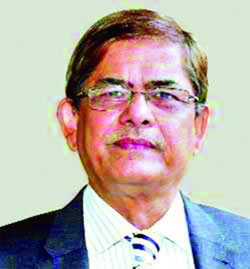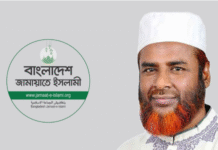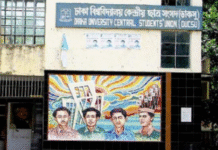Faisal Rahim
Following the installation of the new Awami League-led government after a stage-managed election, the spate of political killings in the country is only escalating causing more fear of insecurity and panic across the nation.
The new government is suffering from the legitimacy crisis at home and abroad, and BNP chairperson has termed the government ‘illegal’ in view of the very low voters turn out in the polls.
The nation had expected that once the new government is in office, it will try to restore peace by stopping violence including political killings by ruling party goons and joint forces in one hand, and work to improve the image of the government by restoring the rule of law on the other.
But as things appear, flagrant violation of human rights is at work at all levels prompting the international Human Rights Watch to produce a very dismal picture in its annual report for 2014 released on Tuesday.
Crackdown, extreme repression on opposition
It said that the government of Bangladesh is engaged in a harsh crackdown on members of civil society, the media, and political opposition. The authorities often employed violent and illegal measures against protesters, and failed to initiate any investigations into credible allegations of unlawful deaths at the hands of its security forces.
Many people tend to believe that the government could become soft and give space to the opposition to voice its views to help reclaim its image, but unfortunately it is only becoming repressive on the political dissent.
The report said Bangladesh government has failed to stem the cycle of violence by ordering investigations into violations by security forces, and instead has become increasingly intolerant of dissent, going to extreme extents to suppress opposition and criticism.
It said violent street protests broke out in Bangladesh in February 2013 and continued through the year, killing nearly 200 and injuring thousands. The earlier protests were linked to trial of war crimes suspects by the International Crimes Tribunals, the report said.
The street violence continued, it said, after the main opposition party alliance decided to boycott elections of January 5. The December execution of Jamaat leader Abdul Qader Mollah led to further protests and violence prompted the authorities to arbitrarily arrest members of the main opposition party, the Bangladesh Nationalist Party (BNP).
Alleged killing of 294 opposition leaders
Meanwhile, BNP secretary general Mirza Fakhrul Islam has alleged at a press conference on Wednesday that a total of 294 leaders and activists of the opposition alliance were killed so far across the country, in addition to abduction of 187 party men in past three months. He said 10 bodies of victims of extra-judicial killings were found in the past 10 days giving the names of 20 of its party activists who had gone missing in the capital between November 28 and January 1. He further named 65 BNP-Jamaat activists who were killed between October 25 and January 21 across the country.
Fakhrul alleged that terrorism by the state and ruling party goons were still taking place in many districts such as Rajshahi, Dinajpur, Natore, Chapainawabganj, Feni, Chandpur, Lakshmipur, Sherpur and Satkhira.
Not only leaders and activists but ordinary people are being terrified and none of them can stay home safe, he said comparing the situation to that of the Pakistani occupation forces in pre-independence Bangladesh in 1971. He said that the government has already established a de facto one-party rule in the country in a bid to destroying the country’s multi-party democratic system.
Fakhrul Islam Alamgir demanded a judicial investigation of the killings and enforced disappearances.
Interesting is that, the government is passing the blame on BNP-Jamaat men for post-election violence on the Hindu community but reports from the spots by Deputy Commissioners of the affected districts and human rights group points finger at the ruling party men for the dastardly acts.
Diverting global community’s attention
They are doing it to divert attention of the global community from the farcical election to communal violence blaming the opposition for it. But the government is wasting no time to use the joint forces to destroy the opposition blaming them for violence, BNP leaders said.
Meanwhile media reports highlighted the sudden rise in political killings in the country in the last two weeks since January 6, a day after the elections, causing concern among the citizens. At least 24 people who had links to different political parties were slain or found dead in different places. Seven victims belonged to Awami League, nine to Bangladesh Nationalist Party, five to Jamaat-e-Islami and three to Jatiya Party.
BNP and Jamaat were either killed in ‘shootout’ with law enforcers or their bodies were recovered after they went missing. The ruling AL men were killed either in factional clashes or by unidentified assailants.
‘Targeted murders’
National Human Rights Commission chairman Mizanur Rahman has termed the killings as ‘targeted murders’. He asked the government to stop it immediately saying “We have to pay heavily if it is not stopped now.”
‘The killings of political activists are simply targeted murders,’ he said in this connection. Inspector general of police (IGP) Hassan Mahmood Khandkar however, declined to comment; a news report said quoting him saying police are in fact chasing the hooligans who threaten peace and act against the interest of the people and the country… We are trying to maintain law and order effectively’, he said.
News report said, only recently two leaders of BNP and Jamaat were killed in Nilphamari and Meherpur. They were accused in cases related to violence.
In Nilphamari, the police recovered the body of the joint secretary of a local Chhatra Dal, leader from Naria Khamba area. He was number three accused in the case filed over an attack on the motorcade of Awami League lawmaker Asaduzzaman Noor which had left five people killed. He was arrested at Palashbari a few days back.
The body of number one accused in the case was recovered on Sunday last who was organising secretary of Laksmichap union of BNP, the party sources claimed.
In Meherpur, the assistant secretary of the district unit of Jamaat was killed in a ‘gunfight’ with police who was earlier arrested from a branch office of Islami Bank in the town.
On January 18, bodies of two Chhatra League activists and another Chhatra Dal activist were found in Narsingdi. The list is only becoming hefty and what we want to do by publishing this story is to bring the attention of the government to the growing lawlessness and chaos all over the country that need quick actions to stop it.
Political vendetta
In the post-election situation a kind of political vendetta is on the rise throughout the country in which intra-party hostility and rivalries between major parties are causing the killings and bloodsheds.
Moreover, extra-judicial killings by joint forces are also reported in the media to cause panic and a sense of insecurity to most families across the country. People tend to believe that political issues in the country must be resolved politically; involvement of forces – be it public or private — may only spread the anarchy at a huge cost to the nation.
Lessons from other countries showed that repression had failed to continue a party to power in the long run. But meanwhile, the nation paid a heavy price for no fault of its people.
Source: Weekly Holiday










